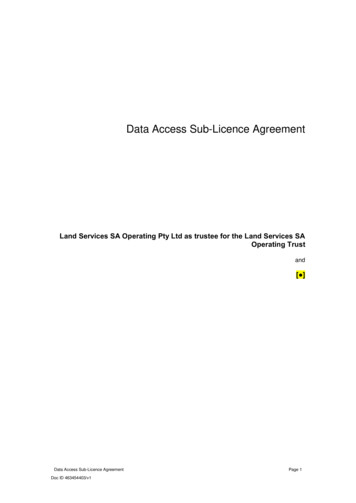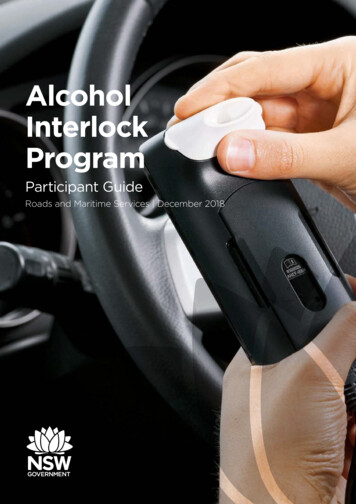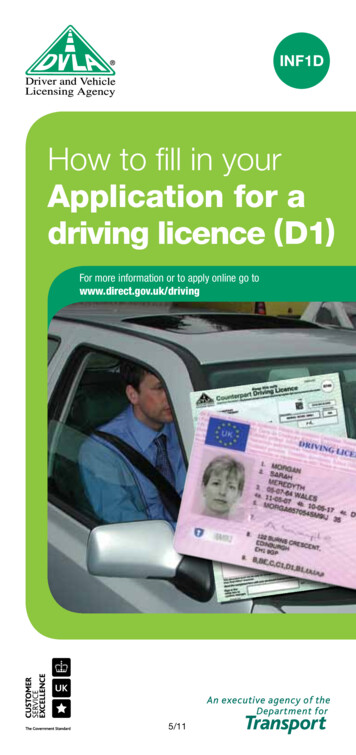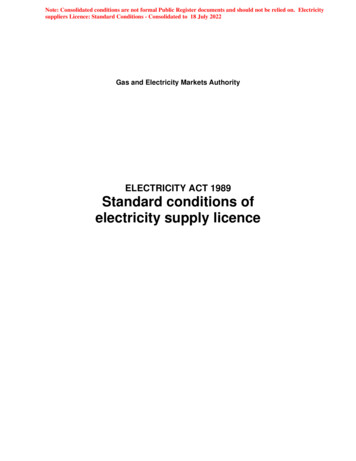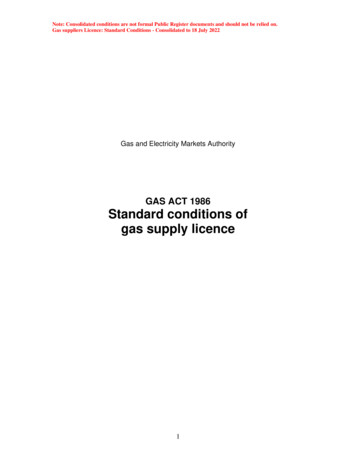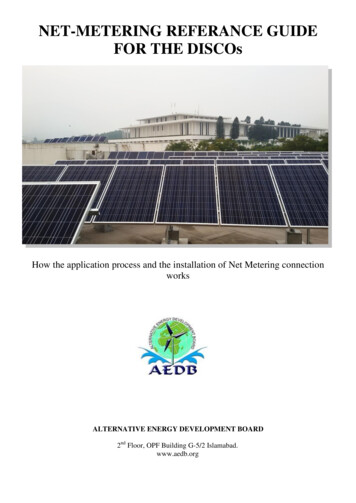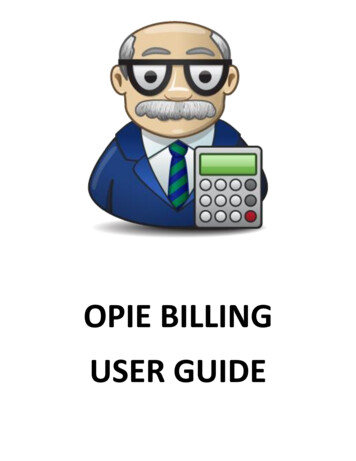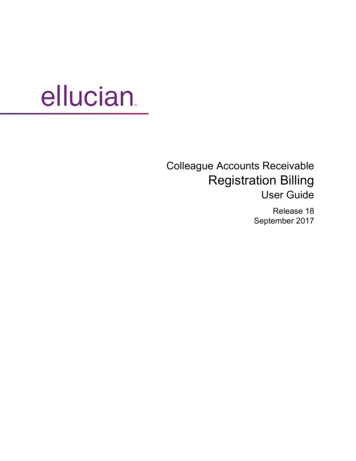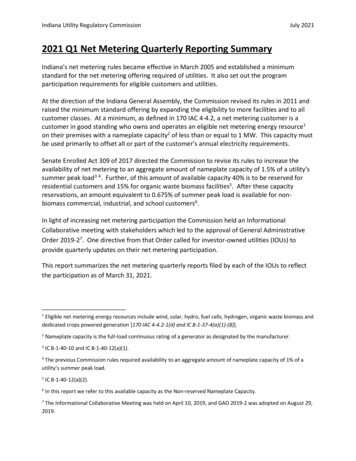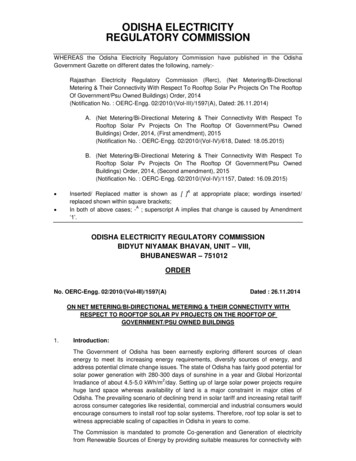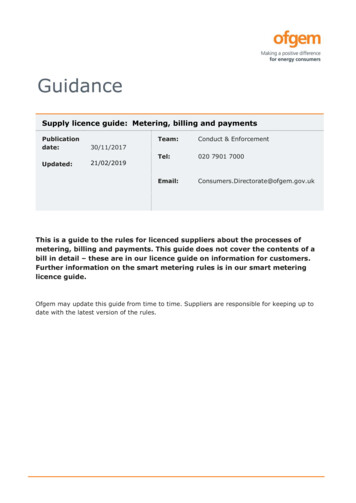
Transcription
Supply licence guide: Metering, billing and 19Team:Conduct & EnforcementTel:020 7901 7000Email:Consumers.Directorate@ofgem.gov.ukThis is a guide to the rules for licenced suppliers about the processes ofmetering, billing and payments. This guide does not cover the contents of abill in detail – these are in our licence guide on information for customers.Further information on the smart metering rules is in our smart meteringlicence guide.Ofgem may update this guide from time to time. Suppliers are responsible for keeping up todate with the latest version of the rules.
Guidance – Metering, billing and payments Crown copyright 2018The text of this document may be reproduced (excluding logos) under and in accordancewith the terms of the Open Government Licence.Without prejudice to the generality of the terms of the Open Government Licence thematerial that is reproduced must be acknowledged as Crown copyright and the documenttitle of this document must be specified in that acknowledgement.Any enquiries related to the text of this publication should be sent to Ofgem at:10 South Colonnade, Canary Wharf, London, E14 4PU. Alternatively, please call Ofgem on0207 901 7000.This publication is available at www.ofgem.gov.uk. Any enquiries regarding the use andre-use of this information resource should be sent to: psi@nationalarchives.gsi.gov.uk2
Guidance – Metering, billing and paymentsKEYApplies toelectricitysuppliersApplies togas suppliersApplies todomesticsuppliersApplies tonon-domesticsuppliers*Some of these rules only apply tosuppliers with more or fewer than acertain number of customers* We specifically state where rules only relate to a subset of non-domestic customers, eg microbusinesses.Overview of metering, billing and paymentsProper metering, billing and payments processes help to ensure that consumers’ interactionswith their energy supply are as efficient as possible, minimising any negative experiences orhassle for the consumer. The rules ensure all information that consumers receive fromsuppliers about metering, billing and payments is timely, accurate, and not misleading.Metering enables accurate billing, supports customers’ ability to change supplier, and is asource of information for consumers. Metering, and access to metering services, is also animportant enabler for organisations wishing to compete in the gas and electricity markets.Smart meters will change the nature of metering and billing, but their fundamentalimportance remains.There are also specific rules relating to the installation of prepayment meters, includingmaking sure that they are safe and reasonably practicable to install in all circumstances of thecase. Where consumers choose or agree to have a prepayment meter installed, it isparticularly important that they have made an informed choice to do so.The main interaction between customers and their supplier is the billing process. Consumersshould receive regular and accurate bills.Consumers should be able to choose to pay their bills using the method that’s best for them.Suppliers can only charge more for one payment method than another if the price differentialis cost reflective. There are also specific rules for suppliers to return accumulated creditbalances promptly.Key Standard Licence Conditions (SLCs) for this themeBelow are the key licence conditions that relate to this theme (metering, billing andpayments). We’ve highlighted some parts of these rules, but you should refer to the actualSLCs for the full detail. The documents listed in the ‘other useful information’ section mayprovide more context to help you understand the intent of the rules, especially ourconsultation documents.3
Guidance – Metering, billing and paymentsRemember:The Standards of Conduct contain enforceable overarching principles that arerelevant across many supplier activities and licence guide themes. (The Standards areSLC 0 for domestic / SLC 0A for non-domestic suppliers.) These are aimed at ensuringlicensees (and their representatives in the case of domestic suppliers) treat each customerfairly. This includes behaving in a fair, honest, transparent, appropriate, and professionalmanner, and providing information that is complete, accurate and not misleading. Domesticsuppliers also need to make an extra effort to identify and respond to the needs of domesticcustomers who are in vulnerable situations.RULES RELATING TO METERINGSLC 12 Matters relating to electricity/gas meters This condition requires suppliers and their agents to take all reasonablesteps to detect and prevent theft, damage to equipment, and interferencewith metering equipment.Customers with advanced meters must also receive timely access to themetering data they request.1Contains rules about installing current transformer electricity meters/largegas meters at domestic and designated2 premises.Also contains rules relating to suppliers ceasing to offer to supplyprepayment services to other suppliers in their supply services area.SLC 25B Interoperability of advanced domestic meters Requires suppliers and their representatives to take all reasonable steps toascertain whether the customer has an advanced domestic meter andcommunicate certain details with the customer about whether thisfunctionality will be supported.Sets out the circumstances in which certain suppliers must provide servicesto maintain meter functionality for another supplier.If the customer has a prepayment advanced meter installed which thesupplier is unable to support, the supplier must install or arrange to install areplacement PPM free of charge.Advanced domestic meters are electricity/gas meters that, as a minimum, provide measured consumption data formultiple time periods (at least daily), and are able to provide the licensee with remote access to this data.2A designated premises is a non-domestic premises at which a metering point falls within profile class 1 to 4 asdefined in the Balancing and Settlement Code.14
Guidance – Metering, billing and paymentsSLC 28 Prepayment meters (PPMs) When suppliers accept payment from domestic customers throughprepayment meters (PPMs), they must give the customer certain detailsabout PPMs, the pros and cons of PPMs, how to use the PPM, and what to doif the PPM is operating incorrectly, and must ensure the PPM is safe andaccessible.If the supplier becomes aware or has reason to believe that a PPM is notsafe and/or reasonably practicable to use, they must make alternativearrangements for the customer.RULES RELATING TO BILLINGSLC 21B Billing based on meter readings Suppliers must take all reasonable steps to obtain meter readings at leastannually, and must make a bill or statement of account available at leasttwice a year, or quarterly where requested and/or if a customer has onlineaccount management (subject to specific exceptions for PPM, smartcustomers and unmetered supply customers).Suppliers cannot charge extra for providing a bill unless a duplicate is beingrequested.Suppliers must take all reasonable steps to reflect accurate meter readingsin bills or statements sent to customers where these have been provided bya customer or obtained by the supplier. If a supplier doesn’t consider ameter reading provided by a customer to be reasonably accurate, it musttake all reasonable steps to obtain a new reading from the customer.Suppliers must make online account management available on request.They must also provide historical consumption information to a customer orother person designated by the customer (e.g. third parties) and explainhow a customer’s bill was derived if requested.SLC 21BA Backbilling Prevents suppliers from backbilling customers for gas and electricityconsumed more than 12 months prior to the date of the bill, incircumstances the customer is not at fault.SLC 27 Payments, security deposits, disconnections and final billsThis SLC covers a number of areas. Of particular relevance to this theme: Suppliers must take all reasonable steps to send final bills or statements ofaccount within six weeks of the end of a supply contract.5
Guidance – Metering, billing and paymentsRULES RELATING TO PAYMENTSSLC 19 Payments to customers This condition ensures that gas suppliers pay any compensation they receivefrom the relevant gas shipper or transporter to the right customerSLC 27 Payments, security deposits, disconnections and final billsThis SLC covers a number of areas. Of particular relevance to this theme: Suppliers with more than 50,000 customers must offer a wide choice ofpayment methods, including payment by cash and prepayment meter. Anydifferences in price between payment methods must be cost-reflective.Suppliers with under 50,000 customers must also offer customers thechance to pay for energy through a prepayment meter as an alternative to asecurity deposit, or if they become aware or have reason to believe that thecustomer will have difficulty paying for their energy.Suppliers cannot require security deposits when it is unreasonable to do so,or where a customer has agreed to a PPM. If they do require securitydeposits, they must not exceed a reasonable amount.3Suppliers must explain how the amount of the customer’s fixed direct debithas been determined and must refund accumulated credit on request.Also contains rules relating to a supplier’s obligations to customers inpayment difficulty, and a supplier’s obligations to take all reasonable stepsto identify vulnerable consumers before disconnecting a premises from itsenergy supply in the case of unpaid charges.Other SLCs you should considerSLC 12A Matters relating to theft of gas/electricity Suppliers and their representatives must take all reasonable steps to detect,prevent and investigate theft of gas and electricity.SLC 17 Mandatory exchange of information 3Suppliers must inform gas transporters if, among other matters, theysuspect gas is illegally being taken, or if they intend to connect or disconnecta gas meter.Suppliers must also give gas shippers certain details whenever they inspecta gas meter.Paragraphs 96 and 97 on pages 15 and 16 of this document clarify what constitutes a reasonable amount.6
Guidance – Metering, billing and paymentsSLC 26 Priority Services Register Suppliers must establish and maintain a Priority Services Register (PSR) ofdomestic customers who may need priority services because they are in avulnerable situation.The SLC sets out factors that may indicate someone should be on the PSR,and the priority services that suppliers must offer these customers for free,e.g. communicating with the customer in an accessible format, andconducting meter readings if the customer is unable to do.SLC 28B Warrants relating to Pre-payment Meters and other supplier actions torecover debts Rules to protect customers having PPMs force-fitted under warrant to recoverdebt, and to improve protections for all consumers in the debt recoveryprocess.Prohibits suppliers levying any PPM warrant charges, and banning installationsentirely, for the most vulnerable customers.Caps the amount that suppliers can levy for warrant-related costs in all caseswhere a warrant is used to force-fit a PPM to recover debt to 150.This condition includes a proportionality principle covering costs and actions ofsuppliers, for all customers in the debt recovery process.SLC 31H Relevant Billing Information, Bills and statements of account This condition is about the provision of information to help consumersunderstand and manage the costs associated with their tariff and energyconsumption, rather than the process of billing itself. Suppliers should bearthis condition in mind when thinking about billing, but we’ve covered the moredetailed rules in the information for consumers licence guide.SLCs 33-49 in the gas supply licence and 39-55 in the electricity supply licence are aboutsmart metering. Some of these relate specifically to the rollout and installation of smartmeters, while others are ongoing obligations such as rules about the use of consumptiondata. Our smart metering guide has more details.Obligations outside the supply licencesThere are regulatory obligations relating to this theme that suppliers should be aware of,other than those contained in the gas and electricity supply licences. This section is notintended to provide an exhaustive list and we remind suppliers they are responsible forensuring compliance with all applicable laws and regulations. There is a wide range of legislation that applies to issues of accuracy of meters andhealth and safety aspects of metering related equipment. Please refer to theRegulatory Delivery website on gas and electricity meters, and the Health andSafety Executive website on these elements. Electricity and Gas (Standards of Performance) (Suppliers) Regulations2015: these regulations (known as the Guaranteed Standards of Performance) setperformance standards for suppliers on making and keeping appointments, fixingfaulty meters promptly, and reconnecting supply after disconnections for debt.7
Guidance – Metering, billing and paymentsSuppliers must pay 30 compensation to customers within 10 days of breaching anindividual Guaranteed Standard. If they fail to pay the customer in time, they mustpay an additional 30.The following are voluntary measures. Although not mandatory for suppliers to follow, wethink they are helpful for suppliers to be aware of, as they can showcase good practice. Meter Operation Code of Practice Agreement (MOCOPA): an agreement thatdefines the operational arrangements between meter operators and distributionbusinesses to support the electricity meter installation and maintenance processes.It is important to note that although MOCOPA is a voluntary agreement generally,in order to install smart meters, meter operators need to be MOCOPA accredited. Prepayment principles: principles developed by the trade association Energy UKwhich commit signatories to ten commitments to raise standards of service forcustomers using prepayment meters. Code of practice for accurate bills: Energy UK have a voluntary billing codewhich represents a series of voluntary commitments developed to go beyond thesupplier licence conditions and applies to domestic customers only. The latestversion (April 2018) can be found here.Other useful informationBelow is a (non-exhaustive) list of some other documents we have published that may helpyou understand the rules in this theme better. Suppliers may wish to consult other helpfulmaterials about good practice, for example those published by Citizens Advice.DocumentDOCUMENTS RELATING TO METERINGConclusions from an enforcement investigation into npower’s compliance withSLC 12Guaranteed Standards of Performance: Open letter on supplier arrangements with third parties Consultation on reforms to the Guaranteed StandardsModified guidance on what constitutes “safe and reasonably practicable in all thecircumstances of the case” as per SLC 28.1BDocuments relating to smart prepayment consumer protections: Final decision Smart prepayment proposalsLicence changes to repeal the two-yearly meter inspection SLCs: Decision Final proposals Policy consultationDateSep 2018Dec 2016Nov 2015Mar 2016Mar 2016Sep 2015Feb 2016Nov 2015Jul 2015Guidance on suppliers' rights and obligations in the case of gas or electricity theftJul 2014Information on consumers’ access to their consumption data once suppliers movethem from Profile Classes 5-8 to half-hourly settlement: Final decision ConsultationMay 2014Dec 20138
Guidance – Metering, billing and paymentsDOCUMENTS RELATING TO BILLINGInformation on protections for consumers who receive backbills: DecisionStatutory consultationOpen letterConclusions from an enforcement investigation into British Gas’ compliance withSLC 24 and 25CConclusions from an enforcement investigation into British Gas’ compliance withSLC 7A, 7B, 14, 14A and 21B and with the Consumer Complaints HandlingStandards Regulations 2008Conclusions from an enforcement investigation into ScottishPower’s compliancewith obligations including SLC 27Open letter on microbusiness backbillingInformation on the transparency of suppliers’ backbilling policies: Final decision ConsultationConclusions from an enforcement investigation into npower’s compliance withobligations including SLC 27Mar 2018Nov 2017Apr 2017Aug 2018Jun 2017Jun 2016Mar 2016Mar 2016Jan 2016Guidance on calculating the calorific value for domestic consumer gas billsAug 2014Conclusions from an enforcement investigation into EDF’s compliance with theConsumer Protection from Unfair Trading Regulations 2008Aug 2011DOCUMENTS RELATING TO PAYMENTSIntroducing a new obligation around installing prepayment meters under warrant: Final decision Statutory consultation Policy consultation Proposals to improve outcomes for prepayment customersPrepayment review: understanding supplier charging practices and barriers toswitching for prepayment customersInformation on payment differentials (SLC 27.2A): Report from a roundtable to discuss prepayment and standard creditpayment differentials Open letter on price differentials between payment methods Guidance on cost reflectivity between payment methodsGuidance on the SLC 27 requirement for suppliers to offer consumers a “widechoice of payment methods”Conclusions from an enforcement investigation into price apportionment by allsuppliersNov 2017Jul 2017Sep 2016Dec 2015Jun 2015Mar 2015May 2014Aug 2009Jun 2014Aug 2012NB our website has a full list of all enforcement investigations.9
Guidance – Metering, billing and paymentsWe remind all suppliers that this guide does not modify or replace theconditions in the gas and electricity supply licences. Neither is it anexhaustive list of supplier obligations or information resources. This guide isdesigned to introduce you to the rules, highlight relevant supply licenceobligations, and signpost to key information that may help you understandthese rules. Suppliers should continue to refer to the conditions outlined inthe most recent versions of the gas and electricity supply licences.10
Further information on the smart metering rules is in our smart metering licence guide. Ofgem may update this guide from time to time. Suppliers are responsible for keeping up to date with the latest version of the rules. Supply licence guide: Metering, billing and payments Publication date: Updated: 30/11/2017 21/02/2019 Team: Conduct .

